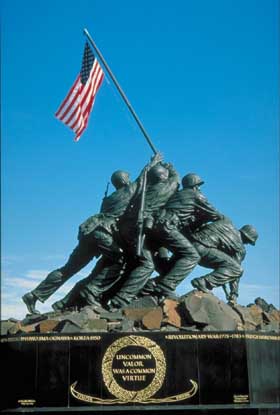
We're reminded of the sacrifices of others each day we pull out of the Terrace and onto Oakwood Avenue. There, to the right -- and adorned with a fresh wreath today -- is a sign honoring two local veterans who died in combat.
To honor all who served their country, I'd like to share a column I wrote for the Times Union last July 4th holiday.
AND THE DEAD SHALL INHERIT THEIR HONORS
By William M. Dowd
"I admit that when I heard the men who also were there share their memories, I cried," said the veteran now in the ninth decade of his life.
He's a born-and-raised New Yorker not often given to sentimentality. He joined the Navy at the age of 19 in World War II, getting his training at Sampson Naval Base in the Finger Lakes. Then, as a grown man with a wife and kids, he served in naval combat during the Korean War.
Like so very many of the rapidly disappearing "Greatest Generation," his health in recent years has prevented him from making it to dedications of new monuments to our veterans and war dead. He does, however, watch such ceremonies on a large-screen TV set his sons bought him a few years ago. He wouldn't miss them for the world.
These days his mind is on the past and how we mark it. Because this week we celebrate the birth of a nation, ours is, too.
In recent years, we have seen long-overdue attention paid to properly honoring all who pledged their lives, their fortunes and their sacred honor, to paraphrase the signers of the Declaration of Independence.
Each time some sort of honor for veterans is proposed, my first reaction is favorable. That may in part be because I am reminded daily of how important such things are.
The reminder is in the form of a small metal sign on a Rensselaer County portion of Route 40/Oakwood Avenue reading: "Lt. Colonel William J. O'Brien and Sgt. Thomas A. Baker Memorial Highway - Congressional Medal of Honor Winners."
It was installed on my commuting route in 2003 in memory of the two Troy soldiers for their spectacular courage under Japanese fire during the historic World War II battle on the Pacific island of Saipan. But it also serves as a prod to be mindful of the sacrifices of all military personnel.
Will we see monuments in the future to the 2,000 Americans who already have died in Iraq and Afghanistan and the others who inevitably will fall there? Of course we will. But it is my fervent hope that it won't take a numbers game to make it happen.
The very fact that any Americans died in honorable service is enough reason to commemorate them. It should not require the coining of a catchy title for a generation, or a groundswell of public guilt over how we ignored the needs of so many after they gave us so much. And numbers certainly should not determine what efforts shall be honored.
Besides, in American military history, the numbers often are out of proportion to the public memory of the event.
In the War of 1812 that so few know about, 2,300 Americans were killed, but only eight died in the Battle of New Orleans most people will recognize. The Battle of San Juan Hill in Cuba during the Spanish-American War, a legendary action that helped propel Teddy Roosevelt to the Governor's Mansion in Albany, claimed just 82 American lives.
The attack on Pearl Harbor on Dec. 7, 1941, killed 2,388 Americans, and another 3,000 died on D-Day, June 6, 1944, on the beaches of France. People readily recognize those events, but far fewer can even tell you where the six-week-long Battle of the Bulge was fought in that same war, even though it cost some 19,000 Americans their lives.
In all these numbers we had a mix of heroes and cowards, privates and generals, amateurs and professionals, willing and unwilling. The common denominator is that they died - some for a belief, some for merely following orders. Either way, those who acted well deserve our enduring respect.
There are those who contend that our military might is our best monument. Lyndon Johnson, the target of public vilification through much of his Vietnam era presidency, addressed that view when he spoke of commemoration and symbolism during a speech in Baltimore 40 years ago:
"The guns and the bombs, the rockets and the warships, are all symbols of human failure. They are necessary symbols. They protect what we cherish. But they are witness to human folly."
No comments:
Post a Comment